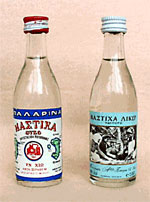Mastika: Difference between revisions
Pepperbeast (talk | contribs) Undid revision 382236764 by 217.33.154.234 (talk) Not helping |
|||
| Line 15: | Line 15: | ||
== Cultural significance == |
== Cultural significance == |
||
''Mastika'' is also the title of a popular song in Turkish [[ |
''Mastika'' is also the title of a popular song in Turkish [[Roma music]] ([[Media:Romany fasil MASTIKA.ogg|Download sample]]). |
||
== References == |
== References == |
||
Revision as of 22:36, 1 September 2010

Mastika (Greek: μαστίχα, from the Greek for "to chew, to gnash the teeth"), is originally a liquor seasoned with mastic, a resin gathered from the mastic tree, a small evergreen tree native to the Mediterranean region and cultivated on the island of Chios. [1].
In Greece two such drinks are known under the umbrella term Mastiha. One, Mastichato Chiou or Chios Mastiha, is a brandy-based liqueur native to the island of Chios. It often accompanies desserts made with almonds and is served at wedding feasts as a digestif. It has a sweet smell and flavour similar to liquorice. The other is a strong spirit similar to ouzo or tsikoudia. It is served cold or at room temperature but usually with ice. Both turn white when poured over ice or mixed with water, and form small crystals when frozen. They are served with various mezedes— appetizers such as octopus, salad, sardines, calamari, fried zucchini, and clams, among others.
The word mastika is also widely used in neighboring countries of the southern Balkans for an anise-flavored liqueur. It is considered the 'national drink' of the Republic of Macedonia. Containing 45% alcohol, it has a hot taste not unlike that of brandy and is usually made from grapes, raisins, plums or figs. It is usually poured over ice and enjoyed with meze. In Bulgaria, it is often combined with Menta, a mint liqueur, to make a traditional cocktail called cloud. In Romania, it is used as a wedding toast and is thought of as a good accompaniment to traditional chicken dishes.
Turkish rakı and Iranian arak are also similar.
Production
The production of mastika usually starts with alcoholic base of made from fermented fruit (usually grapes) and double distilled and filtered through the roots of the mastic tree. The alcohol can also be flavoured with the resin of the tree to give the alcoholic drink its distinctive taste.
Cultural significance
Mastika is also the title of a popular song in Turkish Roma music (Download sample).
References
- ^ "The Magic Tree - Marvelous Masticha", Epikouria Magazine, Fall/Winter 2005
